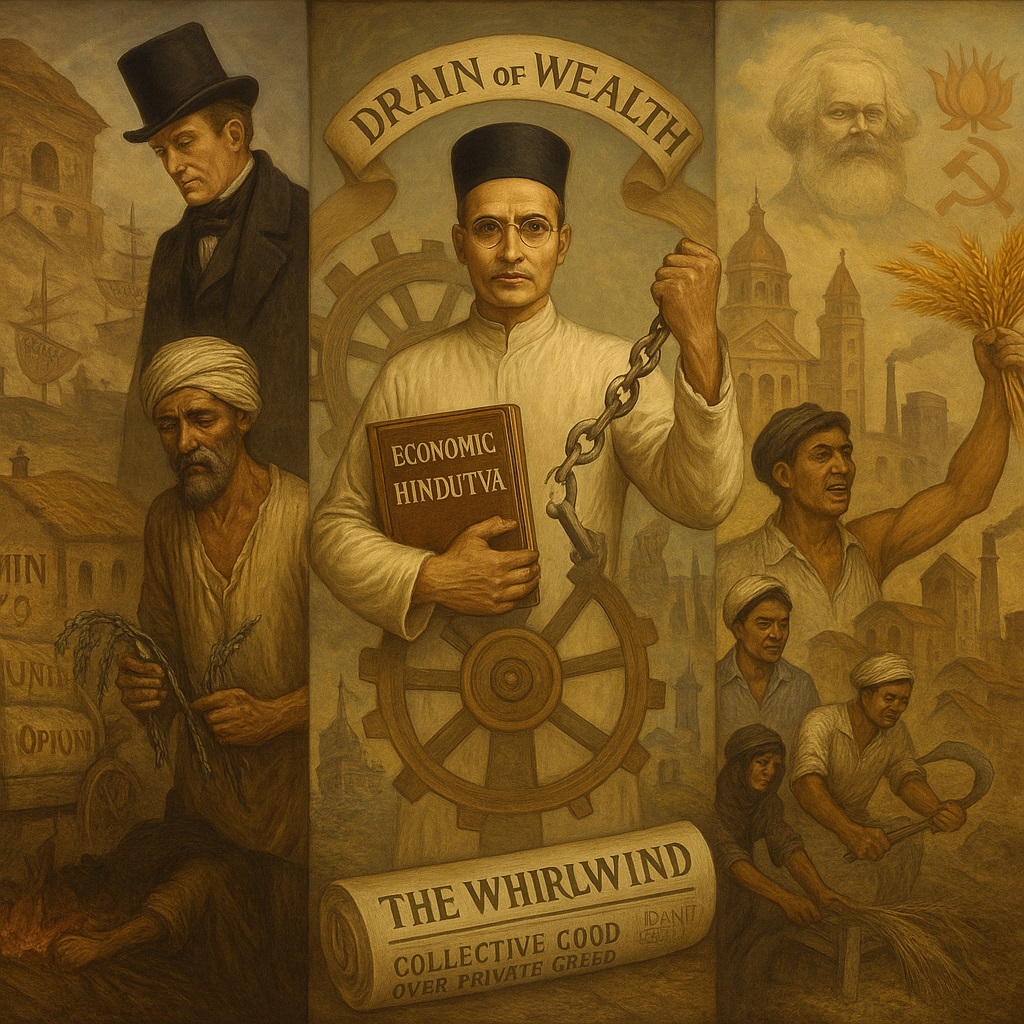Economic Dimension of Hindutva, Part 3
The historical context of India’s colonial experience under British rule offers a complex narrative of economic distress, cultural shifts, and political movements. Among the Indian nationalists who fought against foreign domination, many turned to socialism as a potential solution to the severe economic challenges facing the nation. They believed that socialism offered the only viable way out of the oppressive conditions imposed by the British colonial regime. This sense of hopelessness with the free-market system, which was presented as the backbone of British India’s economy, was shared by several prominent thinkers and activists of the time.
The economic landscape of colonial India was marked by both decline in certain sectors and growth in others. A Marxist-nationalist interpretation of this period puts forth two key theses: firstly, that the decline in economic activity under British rule far outweighed the areas of growth; and secondly, that both the economic growth and stagnation during colonialism were direct consequences of the colonial system itself. These arguments were central to the nationalist push for a new economic and political vision for India.
The Impact of British Economic Policies
One of the most significant economic shifts imposed by the British was the introduction of land taxation. This system forced Indian farmers to cultivate cash crops like indigo, opium, raw cotton, and jute instead of growing food crops for their own consumption. This change drastically increased the vulnerability of rural communities to famine, as the farmers were no longer growing food for sustenance but rather for export, which offered little security. The risk of famine became a persistent threat as these farmers faced the twin challenges of fluctuating crop prices and a reliance on foreign markets that often didn’t prove profitable.
Furthermore, the shift to a commercial agriculture system exacerbated rural poverty. Many farmers found themselves trapped in a cycle of debt, often forced to sell their land to moneylenders. This created a distinct class divide between the moneylenders, who were primarily urban and wealthy, and the rural peasantry. According to the Marxist-nationalist viewpoint, as the influence of moneylenders grew, so too did the stagnation in the agricultural sector, further deepening the rural poverty and socio-economic inequalities.
Decline of Traditional Indian Industry
The British policies not only undermined Indian agriculture but also devastated traditional industries. British imports, including textiles and manufactured goods, destroyed local Indian industries and handicrafts, leading to the deindustrialization of rural India. This contributed to the growth of a vast rural workforce, who were increasingly dependent on low-paying labor.
Although there was some growth in large-scale industry, government, and infrastructure under British rule, it was limited and mostly aimed at serving the interests of the British Empire. Nationalists like Vinayak Damodar Savarkar, along with scholars such as Rothermund, emphasized that the British merely used India as a source of wealth transfer to Britain, which they termed as the “drain of wealth.” This economic policy did little to foster sustainable growth within India itself. While the British built infrastructure like railways, they did so primarily to facilitate the export of goods and to benefit British industries, rather than to develop the Indian economy.
Socialism: A Vision for Change
Against this backdrop of economic exploitation, some Indian nationalists began to look towards socialism as a potential solution. The vision of socialism, based on collective production for consumption rather than exploitation for profit, resonated with many intellectuals and activists of the time. Indian thinkers such as Rabindranath Tagore were drawn to the successes they saw in Soviet Russia, contrasting it with the abysmal conditions under British rule in India. Tagore, in particular, expressed admiration for the Soviet government’s ability to address poverty, epidemics, and food security, even as British rule in India remained indifferent to the needs of its own people.
Dutt, a prominent figure in the socialist-nationalist movement, argued that the idea of socialism was rooted in modern conditions. He noted that socialism, though initially regarded as a utopian ideal, had now become a practical science, especially as it had been successfully realized in other parts of the world. This made it a viable alternative to the exploitative capitalist system imposed by the British.
The Hindutva Perspective and Marxist Influence
While the Marxist-nationalist critique of British economic policies provided a foundation for calls for change, it also influenced other nationalist ideologies, including the Hindutva movement. Figures like Savarkar, who had initially focused on promoting Hindu nationalism, also engaged with Marxist critiques of British imperialism. This intersection of nationalism and socialism highlights the complexity of the ideological landscape during India’s struggle for independence.
Final Thoughts: The Legacy of Colonial Economic Policies
In the final analysis, the economic underdevelopment experienced by India during the British colonial period was not an accident but a result of systemic policies designed to benefit the colonizers at the expense of the Indian population. As Rothermund aptly states, this underdevelopment was “caused by the colonial rulers, though not intended.” The legacy of these policies is still debated today, as the push for economic reform continues to be a crucial aspect of India’s post-colonial journey.
As India moves forward, understanding the intertwined histories of socialism, nationalism, and colonial economic policies remains key to unpacking the complex challenges that shaped modern India’s socio-economic fabric. Whether through the lens of Marxism, Hindutva, or other nationalist ideologies, the struggle for a more just and equitable society continues to resonate with the ideals of those who fought against colonial oppression.
What was the central economic problem India faced under British rule and why did some Indian nationalists turn to socialism? Share your insights in the comments below!
DUTT, Palme R. 1951. Indien Heute. Dietz Verlag Berlin
ROTHERMUND, Dietmar. 1985. Indiens wirtschaftliche Entwicklung. Von der Kolonialherrschaft bis zur Gegenwart. Schöningh (UTB): Paderborn.
ROY, Tirthankar. 2000. The Economic History of India 1857-1947. Oxford University Press: New Delhi.
TOMLINSON, B. R. 1993. The Economy of Modern India 1860-1970. The New Cambridge History of India. III. Cambridge University Press: Cambridge.


Leave a Reply